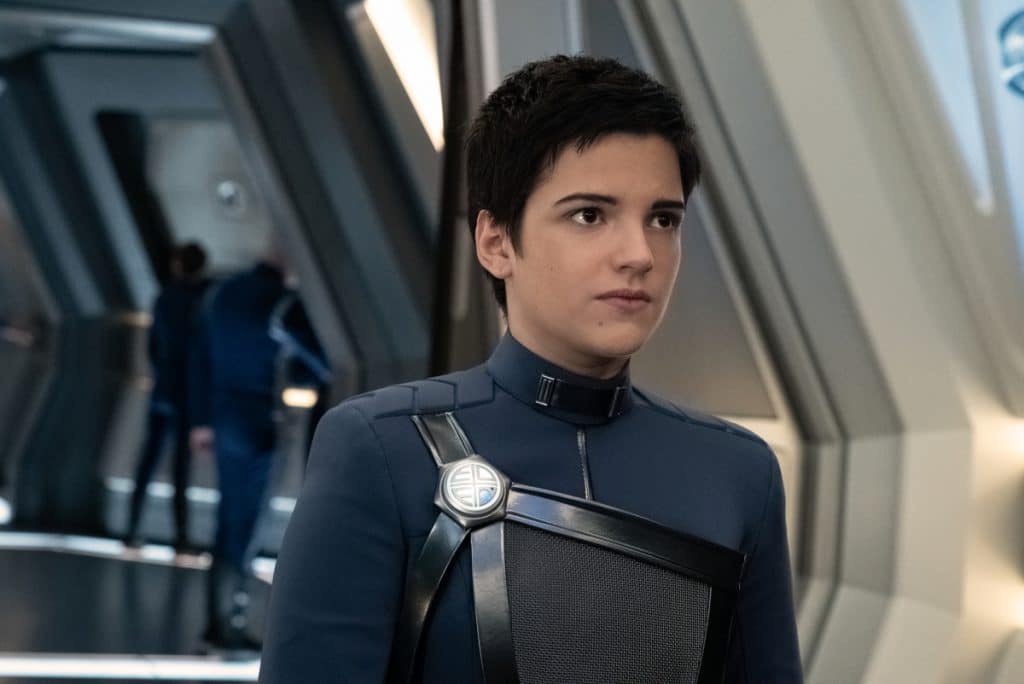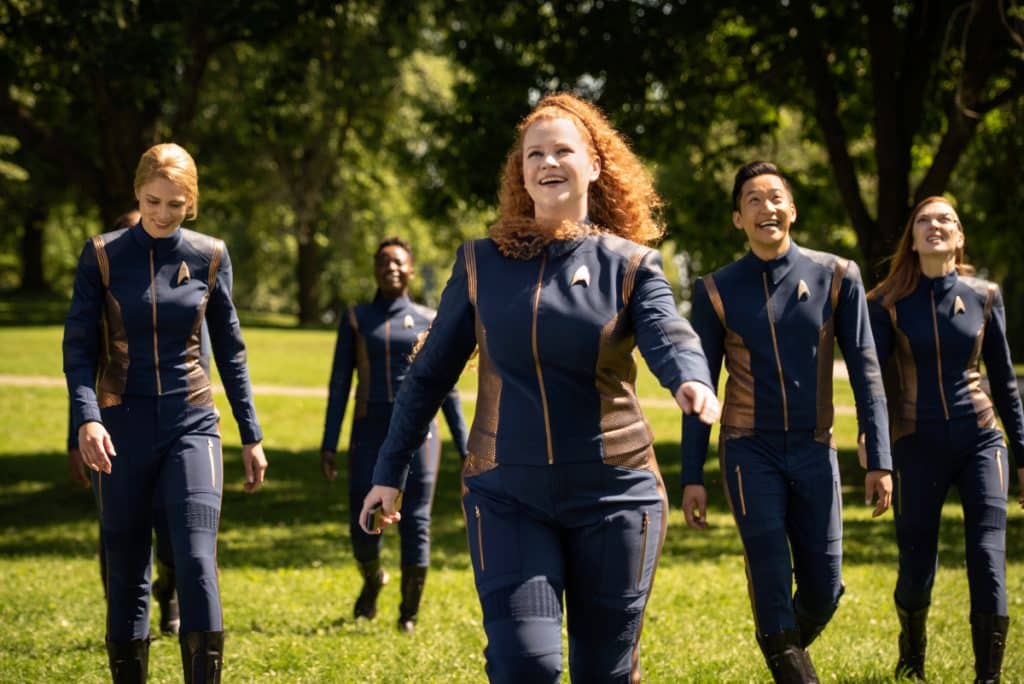Read also:
How to Watch FX Live Without CableHow To Watch AMC Without CableHow to Watch ABC Without CableHow to Watch Paramount Network Without CableBurnham and company adjust to Earth and the Federation’s changes over the years, coping with the concept of home in the process.
There’s a reason TV shows frequently use time jumps between seasons (and I don’t just mean blasting starships 1,000 years into the future). Catching up with major characters months or even years down the line means the writers can change them significantly without having to do any of the pesky work to, you know, show how or why they’ve changed.
It creates a sense of mystery for the audience, leaving us to wonder just what happened during those gaps in the timeline. It invites us to try to piece together the details from off-hand comments about unseen adventures. Also, it gives those characters the opportunity to reconcile who they’ve become compared to who they were when we last saw them.
That’s the track Discovery takes with Michael Burnham (Sonequa Martin-Green) in “People of Earth.” The episode picks up on last week’s revelation that she roamed around the future for a year until the U.S.S. Discovery showed up. In that time, she’s become thick as thieves with Book (David Ajala), joining his line of work as a courier, developing a shorthand with the smirking smuggler, and most importantly, accepting that life as her new normal.
“People of Earth” makes a big deal about how Burnham allowed herself to “let go” of her old ship and her old crew for that matter. The notion comes through, in true Discovery fashion, with a fair number of overwritten and self-serious conversations punctuated with awkward, faux-endearing jokes. But despite those stumbles, it’s a notion worth exploring.

A year in this darker and more mercenary future would change even the most seasoned Starfleet officer. While there’s a little too much signposting for the idea that Burnham was truly independent for the first time in her life and isn’t sure if she wants to go back to following orders, there’s also a question of whether the Discovery is home for her anymore. That personal question dovetails nicely with the more plot-heavy portions of the episode. Those see the Discovery traveling to the Earth of the far-flung future in the hopes of reconnecting with the remnants of Starfleet. When the ship arrives, our heroes likewise discover that their home feels far different than when they left it.
For one thing, Earth is no longer a part of the Federation. The last vestiges of Starfleet and its headquarters moved off-planet to an unknown locale in order to avoid any further targeting by potential enemies. In its place, there’s a testy, trigger-happy local Earth Defense Force that stands on its own. This more traditionally militaristic organization aims to stave off attacks from a group of nearby raiders, which are led by an alien-looking antagonist named Wen.
It’s a shock for our heroes who’d hoped to find at least somethingof the organization and home planet they once knew, so as to help give them some direction in this strange new world. Instead, they find a mistrustful planetary militia that’s cut off from the broader galactic community and scrapping with its neighbors. It’s not hard to read these developments as a metaphor for Western powers sloughing off the bonds of longstanding global alliances, adopting a posture that can charitably be described as “defensive,” and renewing an isolationist streak that goes against their former ideals. The crew of the Discovery seems as startled by that sort of shift as folks in the real world do.

But since Discovery’s still a modern science fiction series, it’s not all political allegories and personal introspection. There’s also a space-bound standoff where the newly confirmed Captain Saru (Doug Jones) and his team have to negotiate with Earth’s military leader, fend off threats from Wen, and avoid starting an all-out war between the two sides. It’s another ethical and strategic dilemma: whether to ply the old methods of diplomacy and refuse to accept the role of aggressor, or to accept the way of the (further) future with its more practical-yet-brutal ethos.
Frankly, Saru’s choice in the episode is pretty dumb, deciding to situate the Discovery between Wen’s forces and Earth’s in a tense standoff. Sure, it’s commendable to stand for what’s right and noble, but that reaches a certain limit when Saru’s endangering his ship—without any backup, mind you—to halt a fight between two veritable strangers. But it’s okay! Burnham has learned a thing or two in her time as a shiftier, scrappier rogue.
In true Star Trek fashion, she figures out a way to let the Discovery have its cake and eat it too. She comes up with a ploy to trick and kidnap Wen off-screen so her crewmates can use him as leverage to stop the raiders’ attacks. The move suggests some underhanded dealing and outlaw impulses have creeped into Burnham’s M.O. over the past year. And yet, even as Burnham uses more questionable methods to solve the immediate problem, she and Saru arrive at a characteristically Starfleet solution to the bigger one in the end. They force Wen and the Earth commander to talk to one another and resolve their differences, rather than just exchanging phaser fire.
It’s another ethical and strategic dilemma: whether to ply the old methods of diplomacy and refuse to accept the role of aggressor, or to accept the way of the (further) future with its more practical-yet-brutal ethos.
Burnham kick-starts those conversations by unmasking Wen, revealing that he isn’t only human but also a representative of the colony on Titan. His group suffered their own tragedy there and just want a slice of the much-needed resources he claims Earth is hoarding. In the overly tidy but well-intentioned sequence that follows, Saru and Burnham help these two warring parties see their common ground and shared humanity.
It’s all a little too neat, but it’s nicely of a piece with the episode’s larger theme, not to mention the nascent theme of the season. The wonders of the galaxy still aren’t for the timid, but the galaxy itself has become a rougher and more unforgiving place with the passage of time. Despite that fact, our heroes still have the ability to restore the light and idealism they brought with them from the past, even to a home that’s very different from the one they left.
The episode’s closing moments center on Starfleet Academy and an ancient but still verdant tree at its center. The hearty bit of flora remained standing, a symbol for how the roots of the organization it signifies, and its guiding beliefs, remain strong. The moment seems to say that the place you came from may change dramatically, but the important things can stay the same and draw you back.
It’s enough to draw Burnham back, at least. Despite the perfunctory hemming and hawing over whether she’s changed too much to return to the Discovery, she ultimately bids Book farewell and rejoins the crew of the Discovery as First Officer (for now at least). She still needs time to reconcile where she left off as a Starfleet officer and who she’s become in the past year. But however much she and the universe have changed in one year or 1,000, this ship and these people are still home to her.
Ensign’s Log:
- Speaking of finding a new home, we meet Adira (Blu del Barrio), an Earth-bound 16-year-old with an aptitude for science who wants to join the Discovery’s quest to find what’s left of Starfleet. Adira is the franchise’s first nonbinary character and a boon to Star Trek’s longstanding ideals of representation.
- Adira, it turns out, is a human carrying a trill symbiote, which not only explains her deep understanding of comparatively ancient tech (thereby avoiding the Wesley Crusher-esque wunderkind pitfalls) but also gives her a connection to the Starfleet admiral the Discovery followed here.
- The last time Star Trek fans saw a trill within a human host, things didn’t go so well. Commander Riker and the symbiote both nearly died from the experience in a short amount of time, but apparently, medical science has advanced enough in the ensuing eight centuries to fix that.
- Saru is officially a captain! It’s a nice win for him after his journey over the past three seasons, and it frees up Burnham to continue having adventures without the full burden of command.
- The last we heard of Saturn’s moon Titan in Star Trek, it was reputed to be a place for exceptional spaceship maneuvers. It turns out it still is (albeit in a… slightly different context).
- The show is still trotting out the perfunctory Burnham/Book romance angle here, replete with a conversation between Book and Mirror Georgiou (Michelle Yeoh) that has big “meeting the parents” energy. The chemistry and writing to support all this still aren’t there, but maybe, like the future writ large, Discovery will settle into it.